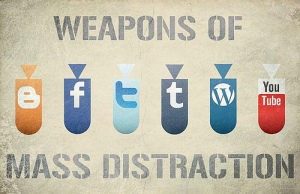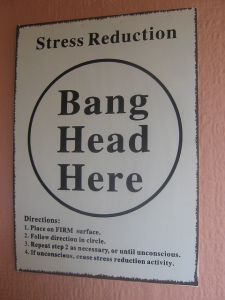 So here’s the thing – I hate running in January. Nope, it’s got nothing to do with the weather – Singapore has only one climate all-year round: Hot and sweaty. Like the title of a porn movie. And it’s not because I don’t like exercising in general.
So here’s the thing – I hate running in January. Nope, it’s got nothing to do with the weather – Singapore has only one climate all-year round: Hot and sweaty. Like the title of a porn movie. And it’s not because I don’t like exercising in general.
I hate running in January because there are way Too. Many. People.
Every time January 1st rolls around, the track I usually frequent actually looks like a porn movie: filled with panting, sweaty people doing laps.
Most of these folks got up on January 1st and decided that they would change their lives just because the earth completed another orbit around the sun.
But like clockwork, the track gets pretty damn empty by the third week of January, leaving behind the same bunch of regulars. It’s like all the people who so spiritedly decided 2 weeks ago that they were “Gonna get a six pack!!!” suddenly got together and decided to go on strike. (Oh wait, it’s illegal to go on strike in Singapore…)
Resolutions are stupid.
Lots of people got up on the first day of 2013, got hit by a bolt of inspiration, and wrote down a bunch of resolutions: Get fitter, get richer, get promoted, be a better husband… etc etc.
Don’t get me wrong, I think it’s great that people want to improve themselves. I blog all year round about living a rich life, and part of that rich life involves us being happier, healthier, and more productive.
But the sad truth is, very few people who make resolutions actually manage to keep them. That’s how gyms make money: they sell year-long gym memberships to people who make resolutions to “get fitter”, and then never actually show up after January.
Why are we so bad at keeping our resolutions?
Because resolutions are simply codewords for “wishes”. We envision this ideal, perfect person that we’d like to be, and believe that if we could only visualize it hard enough, we’d become that person. But wishes never got anyone anywhere.
Goals, not resolutions
Screw resolutions. Very few people actually benefit from them anyway.
Instead, let’s talk about something way more effective; something which I hinted at in part 1 of this series on annual reviews. Let’s talk about goals.
Okay, I know, “goals, not resolutions” sounds like some management B.S they teach you at MBA programs. But hear me out for a second here. Here’s the difference between a resolution and a goal:
Resolution: Get fitter
Goal: Run at least 2.4km every Wednesday, do at least 100 crunches on Monday, Wednesday and Friday, and swim at least 40 laps on Saturday morning from 9-11 am. Track progress on weekly basis.
See the difference? A resolution is a wish. “I wish I was fitter.”
A goal is targeted, specific, and measurable. You either ran 2.4km or you didn’t. You either did 100 crunches or you didn’t. (nope, 99.5 doesn’t count either).
Goals hold you PERSONALLY responsible if you don’t complete them.
Resolution: Find a new programming job.
Goal: Get certified in C++ programming, schedule networking meetings with employees in software companies, source for 2 recommendations, apply to 2 jobs a month
It’s true that completing your goal may still mean that you don’t find another job. But who do you think is more likely to get hired: the guy who systematically works through his job hunt and networking checklist, or the guy who sits around thinking that he “should” start sending out resumes?
Most people don’t set goals for themselves. They prefer resolutions. Resolutions are easy, and resolutions won’t hold you accountable. But sadly, resolutions won’t help you move towards a rich life either.
But goals will.
How to set some kick-ass goals for 2013
Okay, let’s figure out how to set some awesome goals for 2013. I got this idea off Chris Gulliebeau’s blogpost on annual reviews, which I highly recommend to anyone who’s serious about doing anything awesome this year. You can read about his framework here, and download his goal-setting template here.
Essentially, good goals have 3 essential characteristics
- They focus on a specific behavior or action, not an outcome – So “focus more at work” isn’t a goal, but “sleep at least 7 hours a day” is.
- They have a deadline – I usually set a specific date (usually the end of a quarter) for mine
- They’re measurable – great goals have metrics that you can define and review regularly to determine if you’re succeeding.
So if you’ve already made the mistake of setting up some resolutions for yourself, do yourself a favor and turn them into goals instead. You’ll be more likely to complete them.
You can follow Chris’ framework on how to set your own goals, but in a nutshell, the steps are:
1. Define a few categories to split your goals into.
My categories this year are: Cheerfulegg, Health, Personal Finance, Career, Relationships, Spirituality and Learning. Some people, like Paula from Afford Anything find that having a long list of categories may cause them to lose focus. If that’s you, then feel free to limit it to just 2-3 categories. But I’ve personally found that it’s best to set goals for all aspects of life – striving towards one area while sacrificing the others has made me miserable in the past, so I’ve learnt that balance is usually the best formula.
2. While thinking of each category, think about 3-5 measurable goals for each.
For example, some of my goals under Cheerfulegg are:
- Create a free mini-product for loyal readers
- Convert cheerfulegg.com into a self-hosted domain
- Write book proposal and source for publishers
3. Come up with a set of sub-actions
This doesn’t have to be extremely detailed. For example, under the goal of “write a book proposal” I might include “ideate, organize, write first draft, share for feedback, edit, write second draft, etc”
4. Set a deadline for the completion of the project.
This should be a specific date. If you’re not sure, pick the end of a particular month.
5. Finally, pick a set of metrics that you can use to track your progress.
For example, I might pick something like “number of pages written” or “number of peer reviews”
Dominate Your Goals In 2013
That’s it! If you think that this sounds like a helluva lot of work, well, it is. It took me a couple of days of reflection before I could come up with a list I was happy with, but it was definitely worth the effort.
Writing everything down will give you a clarity and focus that will be crucial to completing your goals, especially in the face of temptation. And hopefully, with a bit of luck, perseverance, and hard work, you’d be dominating your goals and kicking some ass in 2013. Good luck!
Image credit: kidgrifter






